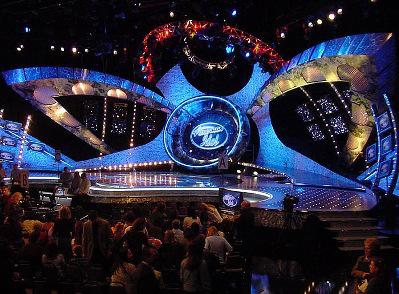 The Kodak Theatre where American Idol took place
The Kodak Theatre where American Idol took placeAct Three: “The Final Showdown”
Second (and last) Scene of Act Three: The setting is inside St. John the Baptist Church, re-fashioned and re-designed to look like the interior of the Kodak Theatre in Los Angeles, where the American Idol finals normally take place. A brief interlude between Scenes i and ii allows for a change of venue from the inside of Randy Jackson’s Imported Shoe Emporium to the above-named place of worship.
It is mid-afternoon. Bright sunlight streams through the stained-glass windows and into the church’s pews. The setting is, basically, the same as that of Act I, only the church has been festooned with streamers, flags, colorful ribbons lining the benches and aisles, and a veritable riot of signs and posters. Los Angeles itself appears to have come out for the big finale to the American Idol Song Contest.
A gospel choir is in full “hallelujah” mode, singing and clapping up a storm. A Baptist preacher is there too. The pews are packed with worshippers and onlookers, along with a fleet of media types, photojournalists, and gossip columnists. Trade guild members from every walk of life are present as well, including various union activists, i.e., Local 22, who hold up “Strike Now” signs. There’s a union vs. labor feel to the proceedings, à la the movie Norma Rae (“Union Now!”), that sort of thing.
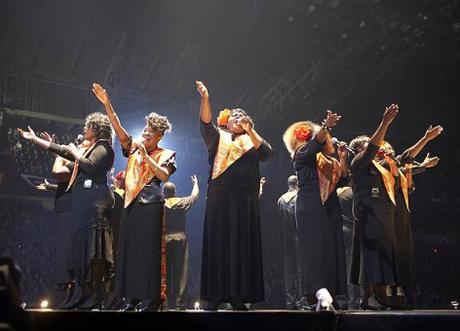
In addition, announcer Ryan Seacrest, the original host of American Idol, can be spotted in his role as a roving, onstage “commentator” on the action. He goes from spectator to spectator, thrusting his microphone into the faces of individuals and asking them for their opinions as to what’s going on.
Trade guild members are also clamoring for attention, gesturing to Seacrest to come hear their side of the story. “Hey, man, we all in this together!” they shout, as each group recounts their experiences of living and working in the City of Angels.
Meanwhile, William Hung enters the church, followed closely by his immigrant co-workers. They spot some young parishioners among the aisles and, in as “gentlemanly” a fashion as their native customs will allow, escort the girls to their places.
The co-workers warn William to watch out for Kelly Clarkson, who happens to be seated across the aisle and is jealously eyeing him. Hung smacks himself upside the head and absentmindedly waves goodbye to the girls.
Next, we have the Dance with the Apprentices. This can take the form of “The Fly Girls” (with JLo and Carrie Ann Inaba prominent among the dancers) in the manner of Keenan and Damon Wayans’ sketch-comedy series from the 1990s, In Living Color; or a tribute to the Super Bowl half-time show with Justin Timberlake and Janet Jackson doing their shtick in time to the music (even the titillating breast-revealing number!!!).
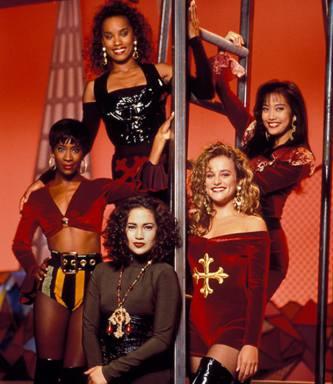
Either way, after the Dance is over everybody makes way for the Entrance of the Mastersingers. Yes, all ten of ‘em, made up to resemble those pop stars of old, the traditional keepers of the American Idol flame: Elvis and Frankie, Tony Bennett, Paul McCartney, Mick Jagger, Stevie Wonder, Simon and Garfunkel, and, of course, Simon Cowell and Randy Jackson picking up the rear. During the Silentium portion of the program, onstage trumpeters dressed as Mexican mariachi players, with huge sombreros and fancy outfits, astound the crowd with their musicality.
There are placards galore hoisted about: “We love you Clay,” and “Simon Sucks!”, “Hooray for Randy,” and “Paula, You’re the Best!” Guest appearances by Britney Spears, Shakira, Madonna, Michael Jackson, in short all of Los Angeles’ best known headliners are here in one hefty basket.
Randy steps up to the platform to deliver a few prepared remarks. As he’s about to speak, the crowd rises in their pews to intone the great “Awake” (“Wach’ auf”) chorus, which is played fairly straight. Moved by their rendition of the hymn, Randy hems and haws until he regains his bearing. He rattles off his musical philosophy of life, trying his best to sound humble amid the flamboyance of the other participants.
In conclusion, Randy praises the elderly Clive Davis for his vision and foresight in conceding to the rule change that gave Paula the final say in who she can marry. Simon Cowell, alone and to the side, tries mightily to memorize the words to Randy’s “Morning Song.” Fumbling and fussing, he checks his iPhone, and then goes over to Randy, all the while complaining about the indecipherable lyrics and strange imagery inherent in the number. “Damn you, Randy Jackson!” he gripes. Randy snickers to himself. “That cat’s gonna get himself into a shit-load o’ trouble.” Now Elvis stands up and states that the show must go one.
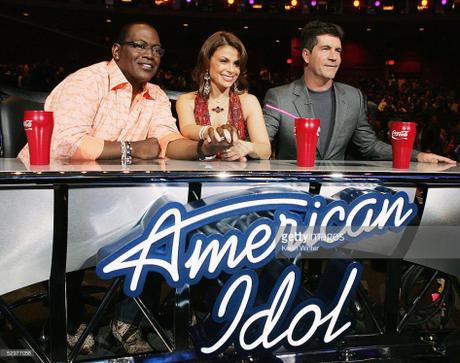
Jay Leno comes around to loosen the audience up before Mr. Cowell gets up the nerve to sing. At long last, it’s Simon’s turn to make his case. Mounting the podium, he complains to the ushers that it’s too unstable. “Can somebody fix this damn thing?” he orders. Immediately, four or five of the ushers prop up the stand. The crowd can’t help but make snide remarks about Simon. All is in readiness. “Let ‘er rip!” shouts Elvis.
Simon whips out his Fender Stratocaster, which appears to be in working order. That is, until he starts to finger the strings. Hmm, a bit out of tune, he muses to himself. As he begins his song (to the same melody as the one used in his disastrous wooing of Paula the night before), Cowell blurts out the line: “Morning has broken like the first morning / Blackbird as spoken like the first bird.”
Huh? The crowd wonders, “What in heck is this? Cat Stevens? He’s channeling Cat Stevens?” Coming from his mouth, everything sounds askew. Simon makes a meal out of Clay’s dream. Even the Mastersingers are perplexed by this apparent faux pas, but they allow it to continue: “He’s a Master, after all.” Yup, he sure is! “Jack of all trades, Master of none!” somebody shouts back at them.
This goes on for a couple of perilous moments, until the crowd is unable to restrain itself. They burst out laughing at the preposterousness of Simon’s words, which are nothing but nonsense in his hands. Simon has had enough. He steps off the platform in a fury and, shaking his fist at Randy, accuses him of being the author of this so-called song. He makes a hasty exit, as the crowd turns to Randy and demands that he provide an explanation.
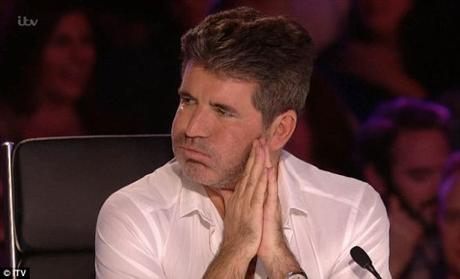
Keeping his composure, Randy disputes the claim of authorship. In fact, the song as written is really quite lovely. Nobody believes him, and the Mastersingers second that emotion. “Simon doesn’t know what he’s talkin’ about,” Randy declares. “This here’s a Master Song if ever there was one. And I can prove it!”
It’s Jackson to the rescue. He boldly introduces the newly minted Mr. Aiken, who steps out from the noisy crowd of onlookers. He’s all decked out in white from head to toe. “Now, then, here’s your author in the flesh. Let him show you what a REAL master musician can do with that tune.”
Clay starts to strut his stuff. He belts out the “Morning Song” with everything he’s got. Paula Abdul, who’s been fairly quiet until now, comes up to the podium and takes her place next to the Mastersingers (in Simon’s empty music stand). She temporarily acts as one of the song-contest judges which, coincidentally or not, she happened to be before Clive Davis “adopted” her.
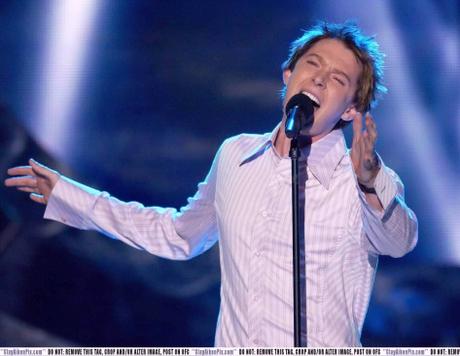
With Simon laughed off the stage, William Hung (who’s already done his exceedingly poor Ricky Martin medley) gets a good belly laugh out this turn of events. After Clay has sung his wooing song, the crowd hails him as the winner of the contest. In like manner, the Old Guard Mastersingers charge Clive Davis with rewarding the victor his spoils.
Davis comes down the aisle to offer Aiken not only the American Idol statuette, but a multi-million dollar record contract deal! Incredibly, Clay turns down the offer, much to the consternation of, well, practically everybody. “Don’t call me, I’ll call you!” he cries.
Just as the disgusted Clay is about to step off the podium, Randy once more saves the day in praise of American pop culture. “Man, you shouldn’t make fun o’ the Masters. They’re offering you a golden opportunity. Don’t be turning down their generosity. Shoot, I know, they can be a bunch a bores, but look at all the good they done. Why, without their art, where would pop music be? In the toilet, that’s where!”
The crowd agrees with Randy’s assessment of the situation. Everyone present joins in, in praise of pop music in general and the American variety in particular. At the rabble-rousing close, the Gospel Choir re-emerges to sing a happy tune, as well as a surprise appearance by the King and Queen of Soul: James Brown and Aretha Franklin.
Swinging in time to the final chorus — in a good-ole-fashion happy hour, in full-blown Evangelical revival-house style — they bring down the curtain to waves and cheers from the multitude, and to the Mexican mariachi band’s trumpet blasts. Everyone motions in time to the music.
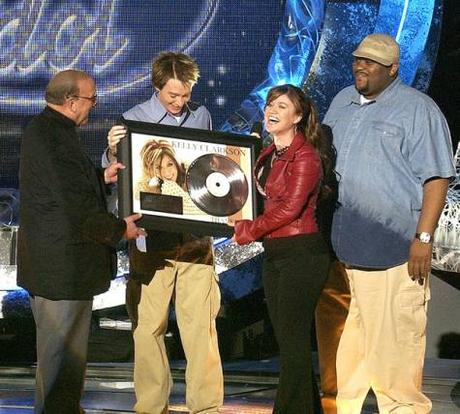
Clay, now getting his Mastersinger medallion from Clive Davis, steps onto the extended platform between the stage and the aisle, and raises his arms in triumph in the iconic American Idol pose. Flashbulbs and cell-phone cameras go off all over the stage, as if a million photographers were snapping everyone’s pictures at once. The houselights come down and the following line scrolls above the proscenium:
There are six million stories in the City of Angels …. This has been one of them.
Lights out!
Final Curtain
(For the background history, plot analysis, and musical commentary utilized in the writing of this essay, I am humbly indebted to the following sources: The Opera Lover’s Companion: Die Meistersinger, written by Paul Nettl, sponsored by the Metropolitan Opera Guild, Inc., edited by Mary Ellis Peltz; Opera on Record: Die Meistersinger von Nürnberg compiled by Richard Law, edited by Alan Blyth; and Wagner Without Fear: Learning to Love – and Even Enjoy – Opera’s Most Demanding Genius, written by William Berger, published by Vintage Books)
Copyright © 2016 by Josmar F. Lopes

